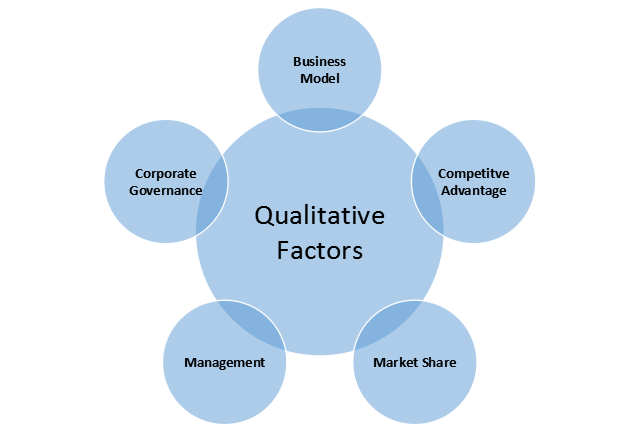Have you ever chosen your investment grade stocks just emphasizing more to fundamentals aspects of a company?
If yes, then you are not the only one.
Many investors forget that the qualitative aspects, as discussed later in the article, as well holds an important role in valuing the company.
Hence, ignoring qualitative aspects of a company can cost the investors profoundly.
So through this blog, we will prevent you from ignoring any qualitative factor, by listing them below and emphasizing their impact on the present and future values of a company.

1. Business Model & Future Value:
The first and the foremost area is to know what exactly the company does?
A business model describes the company’s plans for:
- Making profits, its products and services
- The target market
- Its social and cultural values.
Sometimes it is easy to understand the business model like Tata Consultancy Services-which is solely into IT business and sometimes it gets complicated like Reliance Industries which is into diversified businesses – crude, petrochemicals, retail, e-commerce, telecom, to name a few.
Companies need to constantly update, innovate, adopt efficient marketing and business strategies for its smooth functioning without which they may run into losses and eventually get wiped out from the market.
For instance: Moser Baer is a classic example in this case, where the company failed to identify that the product for which the company had invested thousands of crores was slowly but surely becoming obsolete (Product name: Floppy disc replaced by pen-drive).
The company turned a dream into nightmare and wiped out investors wealth.
Investors should have a thorough understanding of a company’s business model.
Without understanding the future growth drivers of company the investors usually expose themselves to investment risks.
2. Competitive Advantage & Growth :
Competitive advantage helps the company to develop certain strengths or conditions which generates greater value not only for the company but also for its shareholders.
A high degree of operational efficiency along with superiority in factors like cost structure, branding, quality of product offerings, distribution network, intellectual property and customer service contributes to achieve competitive advantage.
It helps to create an economic moat around the business, thus helping the company to keep competitors at bay and to enjoy longevity, growth, profits and dominate the market share.
A company with competitive advantage usually rewards its shareholders for decades.
The best examples of such companies are Pidilite Industries, Page Industries, ITC, Nestle, HUL and United Spirits to name a few.
3. Market Share & Shareholder’s Pattern :
Market share of a company is its portion of total sales in relation to its market or its competitors, over a period of time.
This helps to determine a company’s relative position within the industry.
Companies with larger market share enjoy economies of scale with its operations and improve profitability.
It also acts as a strong entry barrier for other firms and induces confidence across all its stakeholders.
Companies with rising market share not only have robust business models but also the ability to generate market returns greater than its competitors.
Trends in market share are considered early indicators of future opportunities or problems.
Market leaders like Tata Consultancy Services, HDFC Bank, HUL, Maruti Suzuki India among others show how companies with increasing market share have generated return for their shareholders.

4. Management & Company’s Performance:
Management Quality is one of the most important factors for evaluating the performance of a company.
A sound management with strong credibility always works for the betterment of the company, its employees and consequently generates wealth for shareholders.
Thus, it is always in the interest of the shareholders to be associated with trustworthy and competent management rather than with management having questionable credibility like IL&FS or Jet Airways or Gitanjali gems to name a few.
Before taking any investment decisions, always commit towards understanding the management personnel and their profile.
Companies with strong management like Infosys, Tata Consultancy Services, HUL and HDFC Bank had not only shown immense growth but also created wealth for its shareholders while poor management lead to the failure of many eminent companies like Jet Airways, Satyam, Gitanjali Gems and IL&FS to name a few.

5. Corporate Governance:
Corporate governance is the framework of rules, practices and processes which directs and controls the firms as well as involves balancing the interests of all major stakeholders.
The pillars of successful corporate governance are: accountability, fairness, transparency, assurance, leadership and managements which ensure corporate success and economic growth. This leads to positive impact on the share price.
Poor corporate governance raises questions on a company’s reliability, integrity or obligation to shareholders — which can have serious implications on the company’s financial health.
Poor corporate governance in companies like Vakrangee, Manpasand Beverages, Jet Airways, Ricoh India, Kingfisher Airlines, IL&FS and DHFL among others not only had serious ramifications but also eroded investor’s wealth.
Key takeaways:
- Qualitative aspects of a company are as important as its Quantitative factors. It captures the company’s aspects or risks immeasurable by a number.
- As qualitative factors uses subjective judgement based on unquantifiable information, they are relatively more difficult to analyze and represent either a negative or positive force affecting the company.
- Strong qualitative aspects are essential for sustainability and viability of the business. This leads to wealth generation for all the stakeholders and builds investor confidence.
- Thus, investors need to study and analyze both qualitative as well as quantitative factors for better investment selection.










